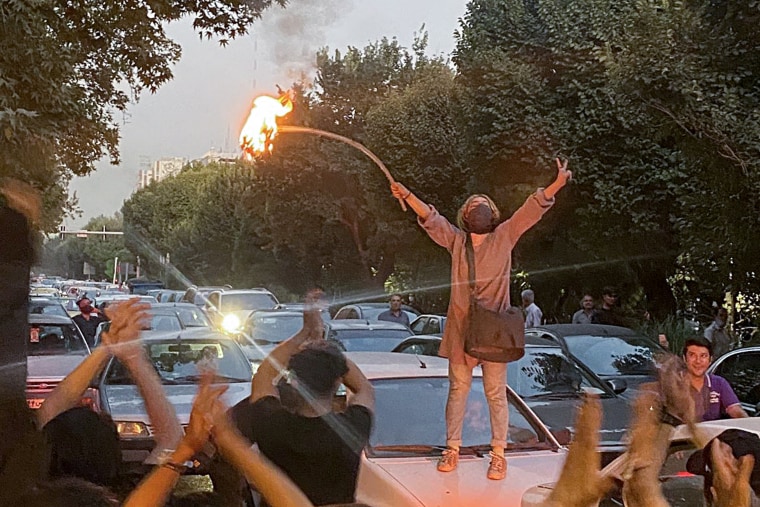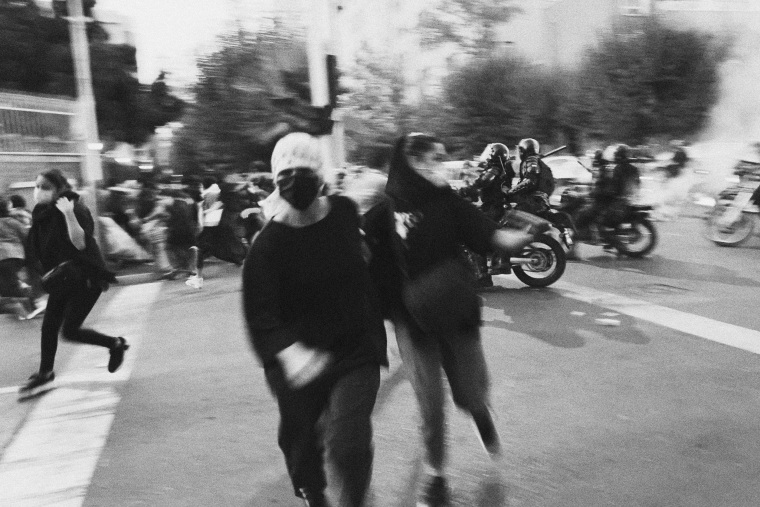The death toll from protests that have gripped Iran grew Wednesday as anger swept across the country after the death of a young woman in the custody of the Islamic Republic's morality police.
The fifth day of escalating anti-government demonstrations saw violent confrontations between security forces and protesters on Tuesday night. Images and video shared on social media showed displays of defiance against the strict dress code that seemingly led to Mahsa Amini’s detention last week.
In one, a woman sits aloft alone in a public street milling with people, head uncovered, cutting off her ponytail before a roaring crowd. Another twirls next to a bonfire, hair flailing and hijab in hand — then tosses the veil into the flames before others follow suit.
As those images and the unrest spread, Iran restricted access to Instagram, one of the last remaining social media platforms in the country, according to internet shutdown observatory NetBlocks.

The death of the 22-year-old Kurdish woman has ignited simmering tensions over social freedoms, drawing thousands to streets across the country and support from around the world.
“I think we’re all in awe of the bravery of Iranian women who have long pushed forward their demands despite all the restrictions,” Tara Sepehri Far, senior Iran researcher at Human Rights Watch, told NBC News on Wednesday. “This time they’re calling out the system nature of morality police violence and call for the abolishing the law.”
“Protests in Iran quickly turn into broader political grievances so what people are chanting in the streets reflect that,” she continued. “But I think it’s fair to say that they united in support of accountability for Mahsa’s death and transformative changes to compulsory Hijab laws.”
Protesters took to the streets in at least 14 cities across Iran on Tuesday, according to estimates by the Kurdistan-based Hengaw Organization for Human Rights, with many chanting against the regime and in favor of women's rights.
Access to the internet in all cities in the Kurdish region has been entirely cut off since early Wednesday morning, according to the group, following similar disruptions reported by state media early this week in the capital Tehran.
Iran’s minister of communications said earlier Wednesday that he had been misquoted after news outlets cited him as saying the authorities might disrupt internet services for security reasons.
Authorities on Wednesday confirmed three people, including a member of the security forces, had been killed during the unrest. Hengaw said the toll was at least seven in the country’s Kurdish region alone.
NBC News has not verified the claims.

Four police officers were injured and a police assistant died during confrontations between law enforcement and protesters in the southern city of Shiraz on Tuesday, state media IRNA reported. In Kermanshah, the city prosecutor said two people had been killed on Tuesday in riots, according to Reuters.
The prosecutor blamed “anti-revolutionary elements” for the deaths, while rights groups accused the regime’s forces of an increasingly violent crackdown.
Over 500 Kurds have been arrested since the protests began, with at least 450 injured in the four Kurdish majority regions of Kermanshah, Sanandaj, Urmia and Ilam alone, according to estimates by Hengaw, which collects on the ground data reports daily from locals in Kurdish cities.
Law enforcement “brutally beat demonstrators throughout Iran,” the organization told NBC News on Wednesday.
It also observed harsher police treatment of protesters in the Kurdistan region compared with the rest of the country.
“In our opinion, the Iranian government will stop at nothing to put an end to the protests. They are militarizing the cities, using force to shut down the internet, and arresting countless numbers of people,” a spokesperson for the group who asked to remain anonymous said.
Authorities have reportedly shot into the crowds, with seven people killed in the region since protests began, according to Hengaw.
Police said Amini died Friday after falling ill and slipping into a coma days earlier as she waited with other women held by the morality police, who enforce the Islamic republic’s strict rules requiring women to cover their hair and wear loose-fitting clothes in public.
Authorities acknowledged making arrests at subsequent protests but denied mistreating Amini and said they were investigating her death. Her family has denied that she had prior health issues.
Rights activists have expressed concerns about Amini’s death and the official response to the demonstrations, with a top United Nations official calling for an independent probe.
Supreme Leader Ayatollah Ali Khamenei did not mention the protests — some of Iran’s worst unrest since street clashes last year over water shortages — during a speech on Wednesday commemorating the 1980-88 Iran-Iraq war.
Iranian President Ebrahim Raisi is in New York this week to attend the U.N. General Assembly, where he made a speech on Wednesday.
The protests threaten to paralyze much of the country, with general strikes spreading to 24 cities in Western Iran this week. The University of Tehran, near the heart of the protests in the capital, has postponed the start of the new academic year by two weeks.